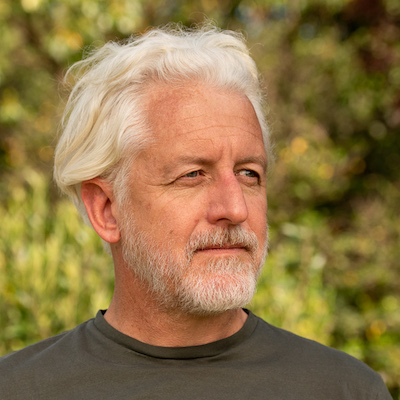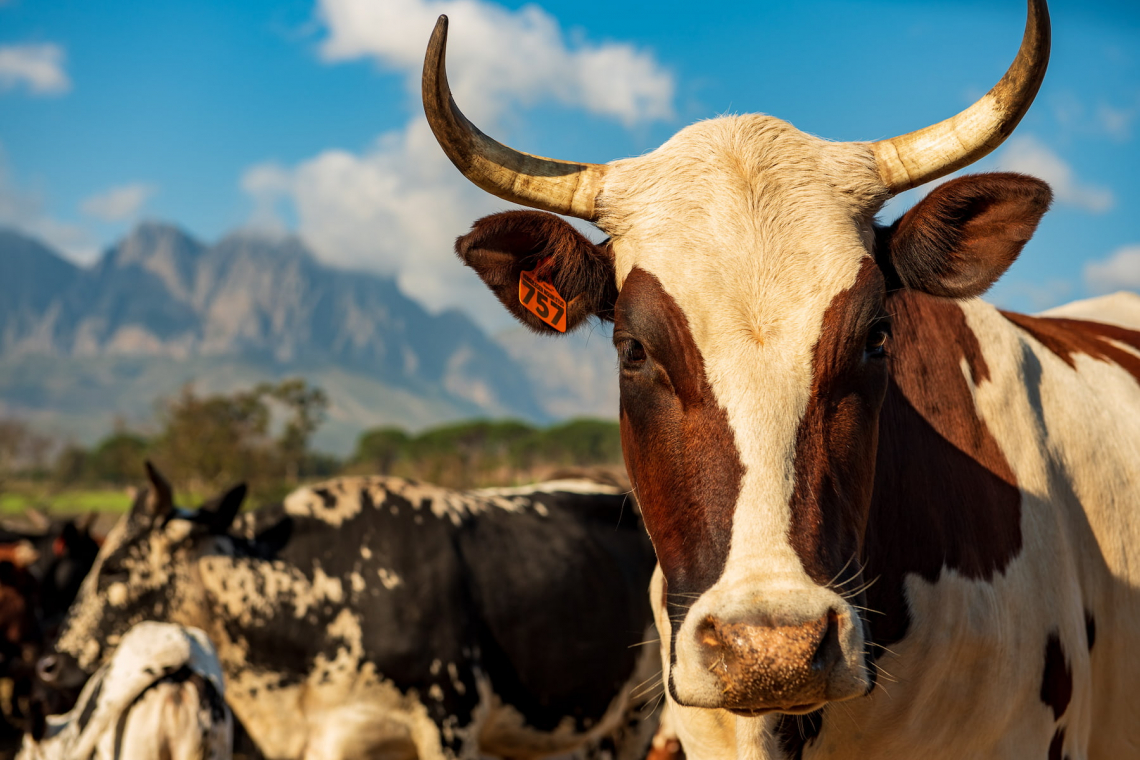International research has shown the massive amounts of land needed to cater for beef production as well as the greenhouse gas emissions of beef emitted by raising cattle. Beef production emits 99.48kg CO2eq per kilogram of food, more than double the closest food, which is lamb emitting 39.72kg CO2eq. As an environmentalist, I needed to make a change in my lifestyle or feel like a fraud. But can I? I love meat and the social traditions built around it.
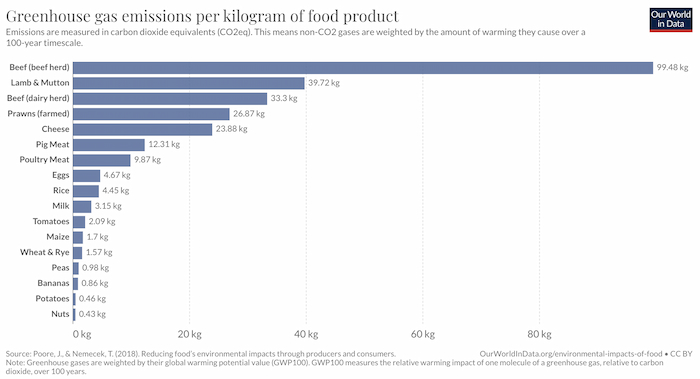
Greenhouse gas per kg of food produced
January 1, 2020, was the day it all transpired. I decided to take the plunge and reduce my meat intake to only twice a month. I wanted to get back to celebrating meat, celebrating the animals I eat. New Years' day is a celebration, so of course, meat was on the menu. Then my daughter’s birthday in January also required a celebration. Ever since, for over two and a half years, I have lived a part-vegan/vegetarian or plant-based lifestyle, and my reason is the environment.
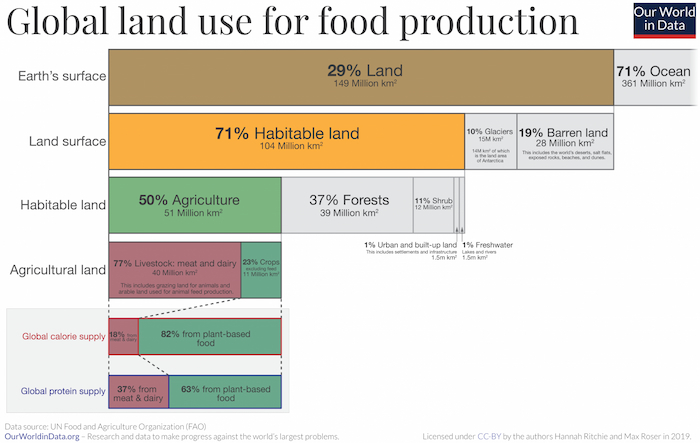
Half of the world’s habitable land is used for agriculture. 77% of that land is used for livestock & dairy.
Why reduce meat intake for environmental sustainability?
Meat consumption globally, in its current form, is not environmentally sustainable. The footprint of raising cattle and feeding them provides a severe concern for ecosystem conservation. Currently, 77% of all agricultural land cater for livestock feeding. By allotting more and more land to feed cattle, ecosystems such as forests are being converted into grain and soya fields to feed cattle.
Humans consume 82% of calories from plant-based foods and 18% from meat and dairy. Using the land that feeds cattle to grow direct consumption foods can preserve more ecosystems. Eating lower on the trophic pyramid is preferred. In theory, this is true, but it is not always easy.

Cow guarding calf on a cattle farm
Difference between vegetarian, vegan and plant-based diets
So here’s the difference between vegetarian, vegan and plant-based, according to the online dictionaries.
Vegetarian [noun]: a person who does not eat meat for health or religious reasons or because they want to avoid being cruel to animals (Cambridge). The Google Dictionary version adds fish (technically meat) - a person who does not eat meat or fish, and sometimes other animal products, especially for moral, religious, or health reasons.
Vegan [noun]: a person who does not eat or use any animal products, such as meat, fish, eggs, cheese, or leather (Cambridge).
Plant-based [adjective]: consisting or made completely of plants, or mainly of plants (Cambridge). According to Google - (of food or a diet) consisting largely or solely of vegetables, grains, pulses, or other foods derived from plants, rather than animal products.
I will add ‘part’ to my diet as I was strictly meatless between my 24 meat meals. I tried to live a part-vegan lifestyle in the times in between meat dishes but ultimately brought eggs back and, subsequently, the cheese. So my diet moved from part-vegan to part-vegetarian. I quickly realised that the labels on the diets did not reflect what I was trying to do. So explaining my diet became almost a full-time occupation. I find many vegetarians struggle similarly. Ordering from menus at restaurants became a serious source of strain.
An example of how very complex moral arguments around meat can be
Is eating meat wrong? The moral argument
Both vegetarianism and vegan lifestyles originally developed from moral arguments against meat. The plant-based diet was initially developed as a concept based on health rather than advocacy for animal rights. Neither of these solutions addressed my environmental focus on the usage of meat. I did not feel meat-eating was unnatural or ethically wrong when I started my journey to cut it out.
Hunter-gatherers have been eating meat and developed cultures around celebrating meat over centuries. An example of this is barbeque or braai as we call it, in South Africa. Meat eating was a treat, hard work to come by and perishable with no refrigeration. Only once we started domesticating animals did the idea of eating the meat we farm develop. Eating meat was a natural progression for humans. But what about the other mammals?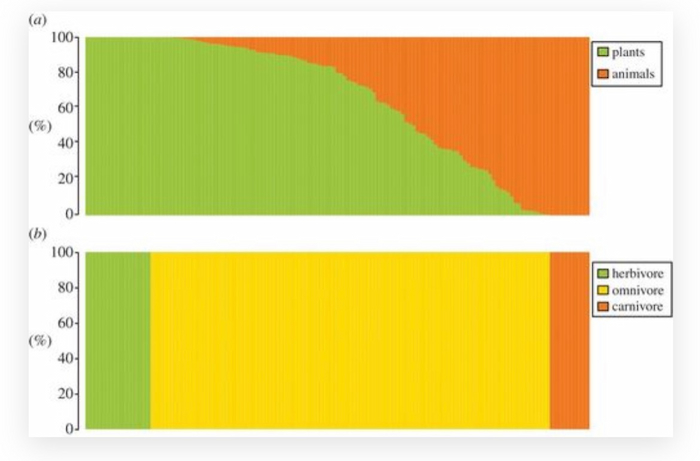
Mammal classification carnivore, omnivore or herbivore does not represent the actual feeding habit splits
Pineda-Munoz and Alroy did a study to classify mammals according to stomach content rather than the standard herbivore, omnivore and carnivore classification. They found that the range of meat and plant matter ingested by animals ranges dramatically. The pure herbivore and carnivore classification sizes are quite low. Most mammals ingested some meat. The below image shows the progression from herbivore to carnivore and the large general category.
If we look at our closest relatives, the Chimpanzees, who have meat as part of their diet, it is clear to me that our species evolved to have meat as part of our diet naturally. Chimp hunting behaviour has been documented to prey on various meat sources from monkeys, eggs, rodents and nocturnal primates. But sometimes, what is natural is not the right thing to do. As humans evolve, we realise what impact we have on the planet. Our societies learn as a collective to aim for a healthier planet, and the impact of meat, especially beef, is immense.
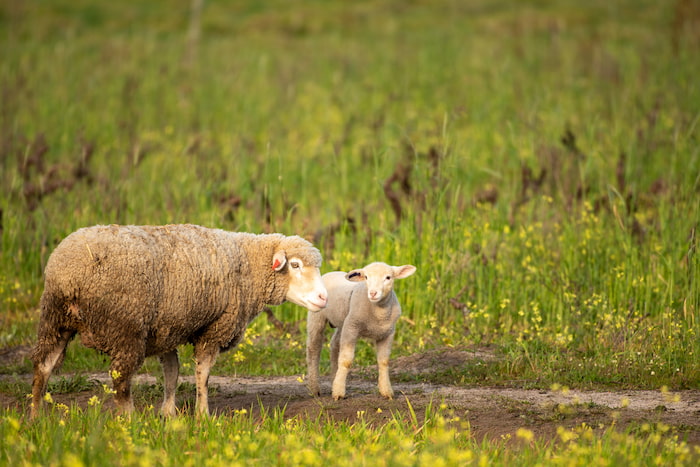
Sheep and lamb on unused wine farm land
Is a vegan, vegetarian or plant-based diet best for the environment?
Ultimately I believe that the vegan lifestyle would have the least impact on the environment. However, I would argue the difference would be very small from an environmental perspective. Having some meat in your diet could actually be good for the environment. If, for example, you eat venison in a sustainably farmed way, the raising of the wild animal you are eating would enable the ecosystems where they are raised to stay intact.
In South Africa, the hunting industry has been vital in rewilding ecosystems classified as marginal farmland by establishing game farms. Game farms can produce game meat to feed us different exciting new venison cuts as a replacement for beef. So by switching to sustainably farmed game meat or venison, you can make a difference.
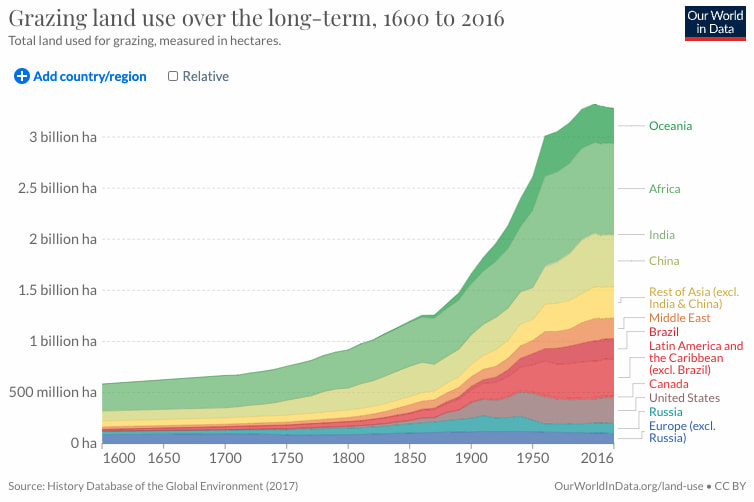
Grazing land use globally
Even eating some beef raised traditionally, roaming the grassy plains could be a sustainable way to keep grassland ecosystems in their original state. The unfortunate state of things is that the demand is just too high for this to be the only way cattle will be raised in the future. Examples of serious environmental impacts include the chopping down of the Amazon to make space for beef grazing and production. Beef farming has also been shown to produce substantial CO2 emissions.
Other forms of meat have a far lesser impact on the environment, as the graph indicates. As my passion is biodiversity conservation, my focus is slightly more on land use than CO2 emissions. But, even land use is a complicated consideration as lambs on a large semi-arid farm can be how the land owner survives, living sustainably with very little impact. Selecting what meat you eat and how often you eat it can make a substantial difference.
